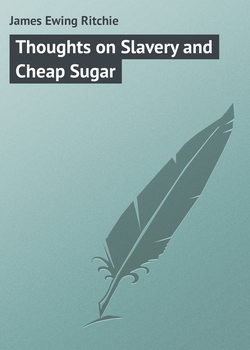Thoughts on Slavery and Cheap Sugar

Реклама. ООО «ЛитРес», ИНН: 7719571260.
Оглавление
James Ewing Ritchie. Thoughts on Slavery and Cheap Sugar
To the Members and Friends of the British and Foreign Anti-Slavery Society
THOUGHTS, &c
Отрывок из книги
At the Annual Meeting of your Society, that has just been held, one of the most crowded you have ever convened, the able and eloquent advocate of free trade, George Thompson, succeeded in carrying an amendment, notwithstanding the avowed opposition of your officers and Committee; an amendment of the most essential importance, pledging you to the consideration of a subject that threatens to impair the usefulness, and to imperil the very existence of the Society you support. As a sincere well-wisher to that Society, as one eager with yourselves for the abolition of slavery throughout the world, the writer of the following pages beseeches you to peruse them in the spirit of anxious solicitude with which they were penned.
You must be aware, by the course you are pursuing, you are losing the sympathies of the popular mind. If you heed not what you are about, the results of last Friday’s vote will materially impair your strength. You are already quoted by men who have no interests in common with the people; you are an authority in the mouths of Conservative statesmen: the advocates of monopoly, and bloodshed, and death, for the former implies the latter, tell us you sanction their proceedings, and smile complacently on their resort to measures that can only derive efficacy from the fact, that they are backed by the soldier’s sword. Religious and peaceable men, as you are, with full faith, believing what reason and revelation alike teach, that truth – mere truth – simple and alone, is stronger than the iron arm of might, succumbs to no power, in heaven above, or on the earth beneath, how can you, how dare you, give the lie to the principles you profess, and ask the aid of government, which is based alone upon physical force? Think you, by the bayonet and ball, to ennoble your noble cause? Know you so little of earth’s history, as for one moment to suppose that wrong ever became right, or that by the employment of means which error has used with success, you can obtain even the shadow of a gain for the sacred cause of truth?
.....
With these few remarks, gentlemen, the writer would commend the Thoughts on Slavery and Cheap Sugar to your most attentive perusal. The subject is of no common importance. If you are wrong, you are altogether wrong, and are a curse instead of a blessing – a curse to the slaves abroad – a curse to the negro on the coast of Africa, who is now murdered when he was before sold as a slave, and whom we would civilise and christianise by transporting to the untilled fields of Jamaica 2– a curse to the labourer at home, whose wretched existence you help to render more wretched still. Well may you shudder as you think of the responsibility you incur. Consider well your present course – momentous interests are at stake. Let your decision be calm and unprejudiced – not given in deference to well-meaning and respectable men – not from any uneasy sensation of annoyance or ill-will, but such as will be in accordance with the light you have. Your cause is a popular one, and you must be in a false position when you find yourselves opposed to the popular will. This one fact of itself ought to excite suspicion. Advocating as you do the rights and dignity of man, you and the creatures and champions of a fictitious aristocracy can have no common ground, and can never be found on a common side. To be amongst such men at all, you must have drifted from your moorings. Look well to it that you rectify this error in time.
One word about the pamphlet. It is written with no reference whatever to the government scheme. It is hardly worth while to attack a measure which surely your Committee will not defend – a measure which will merely drive slave-grown sugar from one market to another – a measure which opens the door abundantly to fraud, and to those immoralities with which fraud is always accompanied. The writer’s object has been to show that our past mode of procedure has not destroyed slavery; – that the adopting the principles of free-trade alone can do this; and that such a course would be a great national boon. All he aims at is the truth; and he should be happy to stand corrected when in the wrong.
.....